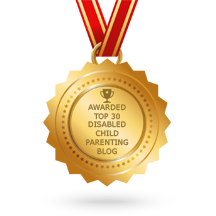A Thought on Speech Delays
I love that I have discovered the stats on my blog now. My favorite thing, right after looking at how many people have visited my site, is looking at the search terms that people have used to get here. It helps me to see what people are looking for and gives me ideas of how people have happened upon my site. One search that popped up this week was “Do babies with DEND syndrome talk”. I wanted to address that in this post, although please keep in mind, this is my own layman’s opinion and not the information from the doctors.
The short answer to this question is yes. More specifically, my own children are both verbal in their own way. Andy is 9 now (almost 10) and is echolalic. He has a huge vocabulary including some choice words that we wish he wouldn’t repeat. He gets in trouble for saying those on the bus, even though we have told the aid repeatedly that the more she pays attention to it, the more he is going to do it. We catch bits and pieces of his day as he sits at his computer game and dinner. We will hear snippets of conversations that he overheard throughout the day. Even with all of that, though, he still can’t have a conversation with you. He tries, but when he really wants to tell you something, it comes out all mixed up and nonsensical. It’s frustrating to me as a mother so I can only imagine how frustrating it can be for him.
Katie is totally different. Her speech pattern, according to all of the speech therapists we’ve seen, is following the normal patterns, but at a much slower rate. She is 5.5 years old now and still speaks like a 2 year old. We have been battling screaming with her for nearly 5 years now. She just absolutely refuses to use her words, but we are trying to draw it out of her. When she starts to whine and fuss that she wants something, we try to force her to use her words. Not only that, though, we try to get her to use sentences. Instead of “banana please”, we make her say, “Mommy (or Daddy), may I have a banana please?” We’ve gotten pretty far with that one and she will now say some combination of that, like “Iiiiiii, WAaaaaan banana peas mommy”. Now who can refuse that cute face she makes when she says that right? Overall, Katie has more conversational speech than Andy, but it is still not at a real level of conversation.
The longer version to this story is that the possibility of a baby with DEND syndrome having speech has a lot to do with which particular mutation they have as well as probably a whole host of other factors. From my own conversations with other families, I have noticed, that within the V59M mutation family, the boys, for whatever reason, tend to be more severely delayed than the girls. There is one girl that I know was speaking at two and has no delays in speech at all. There is also a little boy who is just one year younger than Andy who barely speaks at all. There seems to be a range of severity that varies within mutations as well as on the KCNJ11 gene itself. Some mutations like the R201H and R201C families tend to seem like typically developing children but then have some struggles as they get into school and academics. Then there are other mutations, especially within the DEND syndrome family that are so severe, they can’t even walk until much later in life.
Again, this is all just in my own observations, but the frustrating part of answering that kind of question is that there just aren’t enough patients to even to a good study on it. That I know of, there are only about 15 kids in the US with the V59M mutation. With the varying ranges in age, age of diagnosis, age of transition to the sulfonylureas, and just plain variations in the human genetics, there’s just too many variables to tell how much of the symptoms are caused by the genetic mutation and how much the severity of delays are caused by other factors. My best piece of advice for any parent going through the beginning stages of DEND (or any other diagnosis you are dealing with) is to get as much help as you can. Get your child evaluated through the birth-3 program in your state (if you are in the US) and get speech and occupational therapy early.
There is still so much we don’t know and so much research to be done. We are learning as we go, which is the most frustrating part of having a child with a rare disease/syndrome. Often, we as parents know more than the doctors. We are “pioneers” in the new treatment of this rare type of diabetes. We can only pave a path, one day at a time, for future generations. And hopefully someday, I will be able to talk to my children. For now, I’ll settle for this little birthday wish that I received from my sweet husband while I was at work yesterday:

